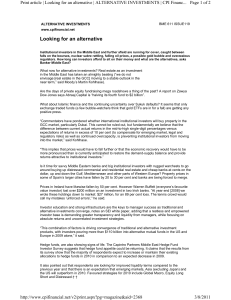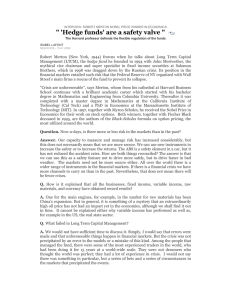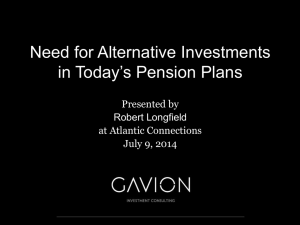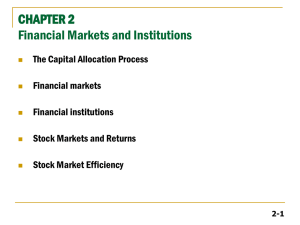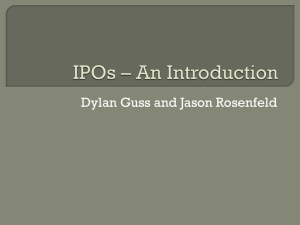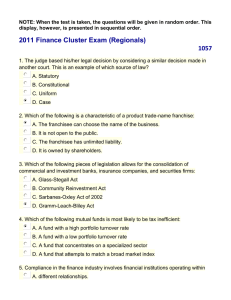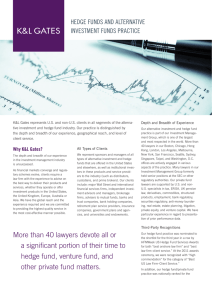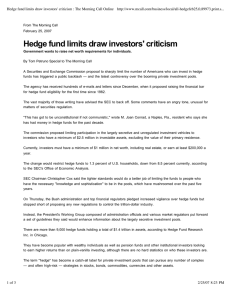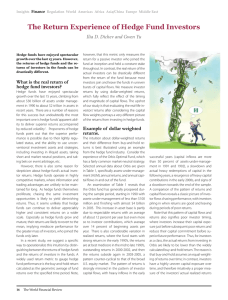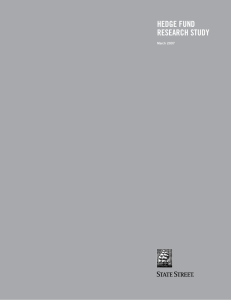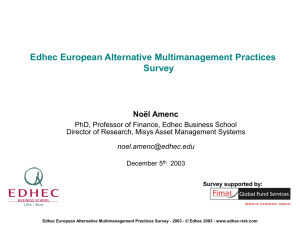Document 11152413
advertisement
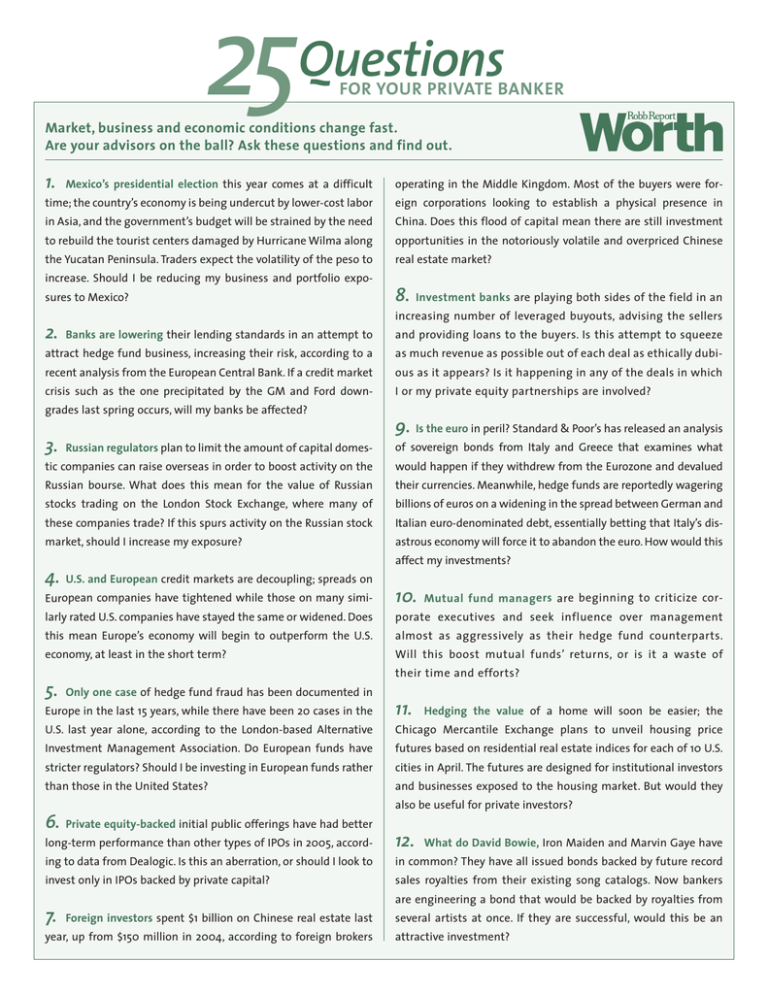
25Questions FOR YOUR PRIVATE BANKER Market, business and economic conditions change fast. Are your advisors on the ball? Ask these questions and find out. 1. Mexico’s presidential election this year comes at a difficult operating in the Middle Kingdom. Most of the buyers were for- time; the country’s economy is being undercut by lower-cost labor eign corporations looking to establish a physical presence in in Asia, and the government’s budget will be strained by the need China. Does this flood of capital mean there are still investment to rebuild the tourist centers damaged by Hurricane Wilma along opportunities in the notoriously volatile and overpriced Chinese the Yucatan Peninsula. Traders expect the volatility of the peso to real estate market? increase. Should I be reducing my business and portfolio exposures to Mexico? 8. Investment banks are playing both sides of the field in an increasing number of leveraged buyouts, advising the sellers 2. Banks are lowering their lending standards in an attempt to and providing loans to the buyers. Is this attempt to squeeze attract hedge fund business, increasing their risk, according to a as much revenue as possible out of each deal as ethically dubi- recent analysis from the European Central Bank. If a credit market ous as it appears? Is it happening in any of the deals in which crisis such as the one precipitated by the GM and Ford down- I or my private equity partnerships are involved? grades last spring occurs, will my banks be affected? 9. Is the euro in peril? Standard & Poor’s has released an analysis 3. Russian regulators plan to limit the amount of capital domes- of sovereign bonds from Italy and Greece that examines what tic companies can raise overseas in order to boost activity on the would happen if they withdrew from the Eurozone and devalued Russian bourse. What does this mean for the value of Russian their currencies. Meanwhile, hedge funds are reportedly wagering stocks trading on the London Stock Exchange, where many of billions of euros on a widening in the spread between German and these companies trade? If this spurs activity on the Russian stock Italian euro-denominated debt, essentially betting that Italy’s dis- market, should I increase my exposure? astrous economy will force it to abandon the euro. How would this affect my investments? 4. U.S. and European credit markets are decoupling; spreads on European companies have tightened while those on many simi- 10. larly rated U.S. companies have stayed the same or widened. Does porate executives and seek influence over management this mean Europe’s economy will begin to outperform the U.S. almost as aggressively as their hedge fund counterparts. economy, at least in the short term? Will this boost mutual funds’ returns, or is it a waste of Mutual fund managers are beginning to criticize cor- their time and efforts? 5. Only one case of hedge fund fraud has been documented in Europe in the last 15 years, while there have been 20 cases in the 11. U.S. last year alone, according to the London-based Alternative Chicago Mercantile Exchange plans to unveil housing price Investment Management Association. Do European funds have futures based on residential real estate indices for each of 10 U.S. stricter regulators? Should I be investing in European funds rather cities in April. The futures are designed for institutional investors than those in the United States? and businesses exposed to the housing market. But would they Hedging the value of a home will soon be easier; the also be useful for private investors? 6. Private equity-backed initial public offerings have had better long-term performance than other types of IPOs in 2005, accord- 12. ing to data from Dealogic. Is this an aberration, or should I look to in common? They have all issued bonds backed by future record invest only in IPOs backed by private capital? sales royalties from their existing song catalogs. Now bankers What do David Bowie, Iron Maiden and Marvin Gaye have are engineering a bond that would be backed by royalties from 7. Foreign investors spent $1 billion on Chinese real estate last year, up from $150 million in 2004, according to foreign brokers several artists at once. If they are successful, would this be an attractive investment? 25Questions FOR YOUR PRIVATE BANKER Market, business and economic conditions change fast. Are your advisors on the ball? Ask these questions and find out. 13. The venture capital overhang nears $60 billion, according to a recent report by Ernst & Young and VentureOne. But despite the requirements. Have any of my funds done so? What recourse do I have? surfeit of raised but uninvested capital, venture capitalists are finding that limited partners are still willing to pony up new 20. Banks can race stocks and bonds to market faster than ever money. Does the overhang threaten venture-stage investment under new SEC rules that establish fast-track securities-offering opportunities, or can the sector absorb it? procedures. But many fear this will further diminish the quality of due diligence, which has proven to be only a cursory formality in 14. Banks are adopting green policies in an attempt to get many cases. Should I avoid fast-tracked securities issues? some positive publicity (while aiding the environment). Goldman Sachs recently unveiled a set of environmentally friendly policies, 21. joining Citigroup and others. Will this make banks and investment ers at Credit Suisse First Boston saying the tool will help insurers, banks more, or less, attractive as investments? investors and companies calibrate and hedge their longevity-related The first index of longevity debuted late last year, with its back- investment offerings and exposures. Could this be useful in develop- 15. Islamic finance is a fast-growing sector, with a host of ing products and strategies for multigenerational estate planning? sovereign issuers, including Germany and Malaysia, rolling out sharia-compliant bonds. Are these good investments overall, or 22. are they only for those who must comply with Islam’s sharia Spending on UK acquisitions was down 15 percent in 2005, the code, which prohibits the payment of interest? first decline since the dot-com crash, according to Zephyr, a Venture capitalists are snubbing Britain for the Continent. research firm. This turns conventional wisdom—that the UK is far 16. British companies lose £72 billion a year to fraud, a figure representing 6 percent of their annual revenues,according to a recent more friendly to entrepreneurs than the Eurozone—on its head. Should I be reconsidering my allocation of risk capital in Europe? analysis by the Association of Certified Fraud Examiners and law firm Mishcon de Reya. Is it riskier to invest in the UK than it is in the United 23. States, where Sarbanes Oxley’s antifraud provisions are in effect? pick high-performing hedge funds—their ostensible skill, and the Fund of funds managers destroy value when attempting to one for which they are paid—according to new research from the 17. The private equity bubble will burst this year, at least in risk and asset management research arm of French business school Europe, according to nearly all the industry experts surveyed late Edhec. More than 80 percent of the value created by hedge funds of last year by the Financial News. Ninety-five percent believe lever- funds comes from strategic asset allocation, not picking hotshot age levels are reaching “dangerous and unsustainable levels.” fund managers, Edhec reports. Does this mean the incentive fees I How should I position my investments in light of this? pay my HFOF managers are buying me underperformance? 18. Energy asset returns may have peaked, at least judging 24. Russia’s business reputation cratered after it cut off natural from moves by savvy financial buyers like Goldman Sachs to gas shipments to Ukraine—and therefore much of Europe—over offload power plants and related investments. Although second- a pricing dispute. The move has the energy-dependent Continent ary market liquidity and interest in assets remain strong, should I scrambling to reduce its dependency on Russian natural gas. Will begin to reevaluate my exposure? this provide entrepreneurial opportunities in the energy sector? 19. Some hedge funds extended their lock-up period to two 25. Credit-linked notes are increasingly popular with institu- years in an attempt to exploit a loophole in the new SEC rule tional and private investors who want to express their investment requiring them to register as investment advisors. Those with view that the credit environment is set to deteriorate. Are these lock-up periods of two years or more are exempt from the new products appropriate for me?

